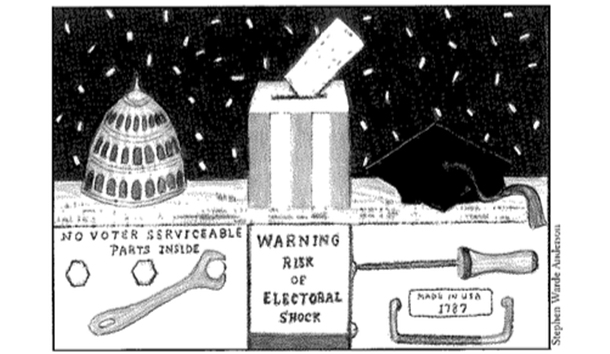The Electoral College, as we used to learn and as readers of this journal will still be aware, was supposed to be a device for removing the choice of the president from the people. Rather than direct elections, which could lead to the nation’s chief executive being the best demagogue, we were supposed to have well-educated and altruistic electors, picked for their wisdom and virtue, select a similar man of character to preside over the nation’s military might and execute its laws. It did not work out that way, of course, and it now seems as if demagoguery has become the chief qualification for all public offices, the presidency perhaps most of all.
The Framers feared faction, and they hoped that presidential electors would not be partisans. They tried to structure a federal system that would not allow the rise of special interests to national dominance, and they thought that, by reserving the choice of electors to state legislatures, they would make sure the interests of the individual states would be protected by the Electoral College. The Electoral College, then, was a device for protecting dual sovereignty, or federalism, just as was the Senate, where each state is entitled to equal representation. The Framers would have been horrified if they had imagined our present system where presidential electors are not selected by state legislators to serve the interests of their states, but are slated by national political parties, elected by the people of the state at large, and—if not always sworn—always understand to vote for a particular party candidate. The parties pick their candidates, not for virtue and wisdom, but for popular appeal or to accomplish a particular political agenda.
Should we then, if we are interested (as we are, here at Chronicles) in the Old Republic notions of virtue, character, and the primacy of state sovereignty, seek to amend the Constitution to do away with the Electoral College system and substitute something more carefully calibrated to reproduce the Old Republic? I do not think so. Consider, for the nonce. the fact that—as soon as it became clear that Al Gore had won the popular vote—virtually the first act of Senator-elect Hillary Rodham Clinton was to call for the abolition of the Electoral College, and that her voice was joined in anthem chorus by a host of media commentators and a brace of other left-leaning redistributionist and large-federal-government-type congressperson. They wanted the president chosen simply by the popular vote. The enemy of my enemy is my friend, say the Arabs, and we ought to pause before dismantling the Electoral College.
The choices the Electoral College now offers us are limited to a particular party candidate, but in the last election, that choice was between one person who was at least publicly sympathetic to federalism and one who clearly was not. The federalist did not have a majority of the popular vote, but he did have a majority of the Electoral College once he secured Florida. He also was clearly the choice of people living in approximately 80 percent of the territory of the United States, and he only failed to carry counties in heavily populated coastal and urban areas. One can win the popular vote, then, and not be the candidate favored by most people living in the American heartland, the South, the mountains, and most of the other locales of American folklore, song, and literature. In short, if there is a lesson from the last election, it may be that real diversity—not the politically correct kind, but the kind that reflects the virtues of the Old Republic—is still preserved by the Electoral College.
For all of its faults, the modern Electoral College, because it assigns numbers of electors based in part on equality of the states, still has the potential to preserve the interests of a majority of those states and to counteract the will of a geographically concentrated plurality of the American people. The Electoral College was designed to secure what is best about the United States—geographical tradition, true virtue, and national character—and I think it still does. It might be made to do it better, but because of the concentration of the popular vote in this country, the chances of getting a constitutional amendment through Congress and two thirds of the state legislatures to accomplish the purpose are negligible. The Senate and the House are already too dominated by the evanescent and the popular, and any amendments to the Constitution regarding the Electoral College which come out of Congress are more likely to please Mrs. Clinton and her friends than ours. It is not broken, and I say, “Don’t fix it.”

Leave a Reply